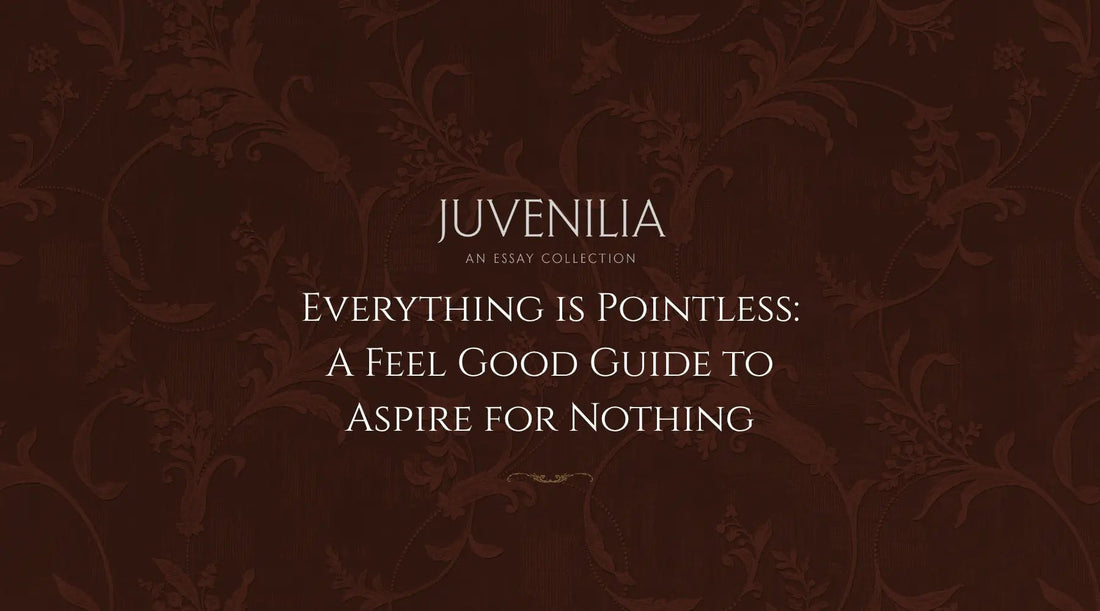
Everything is Pointless: A Feel Good Guide to Aspire for Nothing
In the poem, “The Vanity of Human Wishes,” by Samuel Johnson, the speaker demonstrates different scenarios throughout history where the pursuit of power ultimately goes wrong, and in the of search for our desires, (be they political, financial, intellectual, or sexual in nature) we face only misery as opposed to peace or happiness, which is a very dark, pessimistic take on what life has to offer. He makes the case that all power is pointless because no avenue gives satisfaction because Man is greedy and insatiable, and enough is never enough. Equating ambition with misfortune, envy to unhappiness, and wealth and fame to never-ending conflict, Johnson paints a bleak image indeed. He says that man is ruled by hope and fear, desire and fate, and these emotions, along with pride, lead people astray.
Though the ending may be considered optimistic through religion and with praying to God for saving, the poem is very pessimistic on the whole as the message states that one should never aspire for anything because in the end, all that will be left is misfortune and misery. Although it could be argued that these desires, when inflated surely bring about the picture he describes, he seems not to believe that any being on earth is capable of moderation and that our only salvation is God.
Political power is almost always corrupt because greed and ambition get in the way, and enough is never enough. Johnson gives several examples of such corruption through historical figures and countries. Britain, in Johnson’s time, was overly corrupt, and judges were paid off before evidence was brought up.
Another example is Thomas Wolsey, the Cardinal of the Roman Catholic Church in the mid 1500’s. Wolsey took as much power as he could until he reached his peak, and lost everything. The brave are not motivated by good, they’re motivated by fame. Wars are caused because one nation wants to be the best. Examples of such are Charles XII, a Swedish King and undefeated warrior who sought glory and honour, only to be defeated and miserable in the end. Persian leader, Xerxes, who wanted to conquer the Greeks, disregarded the needs of his own starving army to proceed with his own plans. Instead, nearly all of his army is killed and he’s left with one boat and a handful of soldiers. These leaders died, or ended up in misery because they indulged their desires. Johnson describes this cycle. People are thirsty for power, and people rise, shine and fall.
“Unnumber'd suppliants crowd Preferment's gate,
Athirst for wealth, and burning to be great;
Delusive Fortune hears the incessant call,
They mount, they shine, evaporate, and fall.”
Those in politics can never be safe, as there are constantly scheming rivals trying to overturn positions, and when the inevitable fall happens, everything that was dear will be lost. Hope is gone as is political sway. The love of the people, and any “friends” that once admired, will rain hate and shame upon the once respected person. Johnson paints a very distinct picture of people and the idea that everyone acts only in self-interest, which begs the question, is any of it worth it if we know what the outcome will be time and time again? Johnson doesn’t think it is.
Johnson goes on to talk about the intellectuals, or “Scholars”. The scholar, too, seeks fame, but must avoid temptations in the pursuit of knowledge. He argues that scholars will never know happiness or peace because they can never attain enough knowledge. They are also haunted by grief and and danger, which are the opposing forces to happiness and peace.
Women, historically, use a different kind of power. They use seduction, and their beauty to ensnare the hearts and pockets of their counterparts, which brings only trouble. Not only does the speaker think men are corrupt, but also females. They are described as vain, manipulative, and self-serving, and they have a total disregard for rules and caution. Tainted are their hearts as they don’t hear the voice of virtue or goodness, and instead of procuring knowledge, they have fun, and mess around. The main point here is also the fact that beauty does not last, and once it’s gone, what will be left? This, I believe, the most vaild point he makes.
Time is our enemy. No one should want to grow old because it means more misery. Time takes away happiness and makes everything bland. Things once enjoyed, such as food, wine, or music, become trivial things that no longer satisfy. The ideal life, instead, is free from scorn and crime without getting old, retaining innocence and feeling at peace. But even when thinking about the perfect life, the speaker still manages to tarnish the image. Instead of keeping it a somewhat positive message, he continues, and argues that something bad would happen even in the perfect life. Even if a person is happy, someone could die, fall ill, or become a victim of a crime. It’s a never-ending list of pessimism.
In summary, the speaker believes a person should stay young, be good, and hope he or she dies before something bad happens to them. The only power that can be of use is religion and God, and the only chance we have at a happy life is not anything you can control, but through faith in God, and only then may we achieve peace and contentment. It is important to note, however, that the time difference from when this was written to now reflects a massive change in beliefs in regards to religion. God was a much more prevalent figure that everyone bought into at the time, and when something went wrong, praying to God was the solution. It is not as often in this day and age that people pray when something goes wrong.
Issues are dealt a lot differently now; it would be interesting to see if Johnson would still use God as an argument if he wrote “The Vanity of Human Wishes” today, as opposed to when he did. Would he still believe everyone was corrupt, and that we needed God, or would he have changed his mind? What’s the alternative to God?
Though there’s a brief interlude of optimism, the majority of the poem is highly pessimistic. The pursuit of power, any kind of power, is a dangerous, and fruitless journey, but so is any attempt at living the good life. Reason rarely guides people as most are corrupt, and because people are corrupt, they will never be at peace or happy. Political figures will live in fear of being overthrown, scholars will never attain the knowledge they seek, the brave will never achieve their goals, and the beautiful will become ugly. The speaker ends with the idea that misfortune and misery are all that we can count on in this life, which far outweighs any positive notion of God and religion and that you should be excited to die so the real party may begin.
[WORKS CITED]
Johnson, Samuel. “The Vanity of Human Wishes.” The Norton Anthology of English Literature, 9th ed., vol. 1, W. W. Norton & Company, Inc., 2012, pp. 2843–2852.
